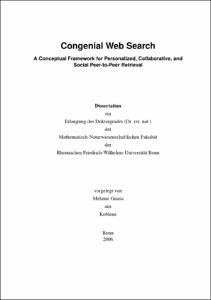Pankiewicz, Maciej Władysław: Collaborative Working Environments : Group Needs Approach to Designing Systems for Supporting Spatially Distributed Groups. - Bonn, 2011. - Dissertation, Rheinische Friedrich-Wilhelms-Universität Bonn.
Online-Ausgabe in bonndoc: https://nbn-resolving.org/urn:nbn:de:hbz:5N-23746
Online-Ausgabe in bonndoc: https://nbn-resolving.org/urn:nbn:de:hbz:5N-23746
@phdthesis{handle:20.500.11811/4707,
urn: https://nbn-resolving.org/urn:nbn:de:hbz:5N-23746,
author = {{Maciej Władysław Pankiewicz}},
title = {Collaborative Working Environments : Group Needs Approach to Designing Systems for Supporting Spatially Distributed Groups},
school = {Rheinische Friedrich-Wilhelms-Universität Bonn},
year = 2011,
month = feb,
note = {Collaboration in spatially distributed groups requires technological support for mediating collaborative activities and members’ interactions over time and distance. Technology provides multiple tools for supporting individual, social and task requirements of collaborative groups. Nevertheless, many aspects of computer-mediated interactions are not sufficiently explained and creating an effective computer-supported environment for collaborative groups as a combination of these tools remains a challenge. Meeting this challenge requires taking into consideration different aspects of collaborative interactions from both social and technological perspectives.
This thesis discusses the social and technical aspects of collaboration in spatially distributed groups and introduces a design approach for collaborative working environments. Firstly, it presents a comprehensive overview of research on collaborative groups, summarizing three interrelated elements under the umbrella of the group needs approach: individual, task and group maintenance needs. Secondly, it proposes a design approach for collaborative working environments on the basis of group needs and thus presents an alternative for designing computer-supported environment for collaborative groups.
This research considers two main types of systems for supporting collaborative groups – groupware and social software – and discusses functionalities originating from these systems. It introduces the Quality Function Deployment method and utilizes its House of Quality concept in order to develop and initially evaluate the First-Stage Prototype – the prototypical implementation of the collaborative working environment combining these two main types. The presented framework is used as a benchmarking tool on the basis of which selected existing platforms for supporting collaboration are evaluated.
This research contributes to the area of the Computer-Supported Cooperative Work and discusses actual trends in development of collaborative systems related to the application of new social tools for purposes of computer-supported collaboration.},
url = {https://hdl.handle.net/20.500.11811/4707}
}
urn: https://nbn-resolving.org/urn:nbn:de:hbz:5N-23746,
author = {{Maciej Władysław Pankiewicz}},
title = {Collaborative Working Environments : Group Needs Approach to Designing Systems for Supporting Spatially Distributed Groups},
school = {Rheinische Friedrich-Wilhelms-Universität Bonn},
year = 2011,
month = feb,
note = {Collaboration in spatially distributed groups requires technological support for mediating collaborative activities and members’ interactions over time and distance. Technology provides multiple tools for supporting individual, social and task requirements of collaborative groups. Nevertheless, many aspects of computer-mediated interactions are not sufficiently explained and creating an effective computer-supported environment for collaborative groups as a combination of these tools remains a challenge. Meeting this challenge requires taking into consideration different aspects of collaborative interactions from both social and technological perspectives.
This thesis discusses the social and technical aspects of collaboration in spatially distributed groups and introduces a design approach for collaborative working environments. Firstly, it presents a comprehensive overview of research on collaborative groups, summarizing three interrelated elements under the umbrella of the group needs approach: individual, task and group maintenance needs. Secondly, it proposes a design approach for collaborative working environments on the basis of group needs and thus presents an alternative for designing computer-supported environment for collaborative groups.
This research considers two main types of systems for supporting collaborative groups – groupware and social software – and discusses functionalities originating from these systems. It introduces the Quality Function Deployment method and utilizes its House of Quality concept in order to develop and initially evaluate the First-Stage Prototype – the prototypical implementation of the collaborative working environment combining these two main types. The presented framework is used as a benchmarking tool on the basis of which selected existing platforms for supporting collaboration are evaluated.
This research contributes to the area of the Computer-Supported Cooperative Work and discusses actual trends in development of collaborative systems related to the application of new social tools for purposes of computer-supported collaboration.},
url = {https://hdl.handle.net/20.500.11811/4707}
}









